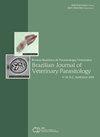Toxoplasma gondii infection in pig intended for human consumption: seroprevalence, risk factors and influence of biosecurity measures
IF 1.2
4区 农林科学
Q4 PARASITOLOGY
引用次数: 0
Abstract
Abstract A serologic and epidemiologic study was carried out in order to determinate herd and animal seroprevalence and associated factors for Toxoplasma gondii in commercial pigs from Espírito Santo state, Brazil. Blood samples were collected from 416 pigs from 55 producer farms in 27 municipalities. An indirect immunofluorescent assay (IFA) was performed to estimate the seroprevalence of T. gondii and identify the associated risk factors using a questionnaire. The T. gondii antibody prevalence rate in commercial swine herds was 15.4% (64/416) using a cutoff of 1:64. The seropositivity for T. gondii was related to the presence of cats, water origin and age of swine in the increase of seroprevalence, and the existence of internal isolation fences and use of composting chambers as protective factors. To the best of our knowledge, this is the first study to report anti- T. gondii antibodies in the serum of pigs in the state of Espírito Santo, Brazil. This finding is important to public health because seropositive pigs can harbor tissue cysts in their meat, thereby representing a zoonotic risk for consumers of raw or undercooked porcine meat or its products.供人食用猪中刚地弓形虫感染:血清阳性率、危险因素和生物安全措施的影响
摘要为了确定巴西圣州Espírito商品猪群和动物弓形虫的血清阳性率及其相关因素,进行了血清学和流行病学研究。从27个城市55个养殖场的416头猪身上采集了血液样本。采用间接免疫荧光法(IFA)估计弓形虫的血清阳性率,并通过问卷调查确定相关危险因素。商品猪群中弓形虫抗体流行率为15.4%(64/416),截止值为1:64。弓形虫血清阳性率的升高与猫的存在、水源和猪的年龄有关,与室内隔离围栏的存在和堆肥池的使用有关。据我们所知,这是巴西圣Espírito州猪血清中首次报道抗弓形虫抗体的研究。这一发现对公共卫生很重要,因为血清呈阳性的猪可能在其肉中含有组织囊肿,因此对生猪肉或未煮熟猪肉或其产品的消费者来说,这代表着人畜共患风险。
本文章由计算机程序翻译,如有差异,请以英文原文为准。
求助全文
约1分钟内获得全文
求助全文
来源期刊
CiteScore
2.50
自引率
7.70%
发文量
90
审稿时长
>12 weeks
期刊介绍:
La revista es un órgano de difusión del Colegio Brasileño de Parasitología Veterinaria, con una especificidad dentro de esa área, la difusión de los resultados de la investigación brasileña en las áreas de Helmintología, Protozoología, Entomología y agentes transmitidos por artrópodos, relacionados con la salud animal.

 求助内容:
求助内容: 应助结果提醒方式:
应助结果提醒方式:


